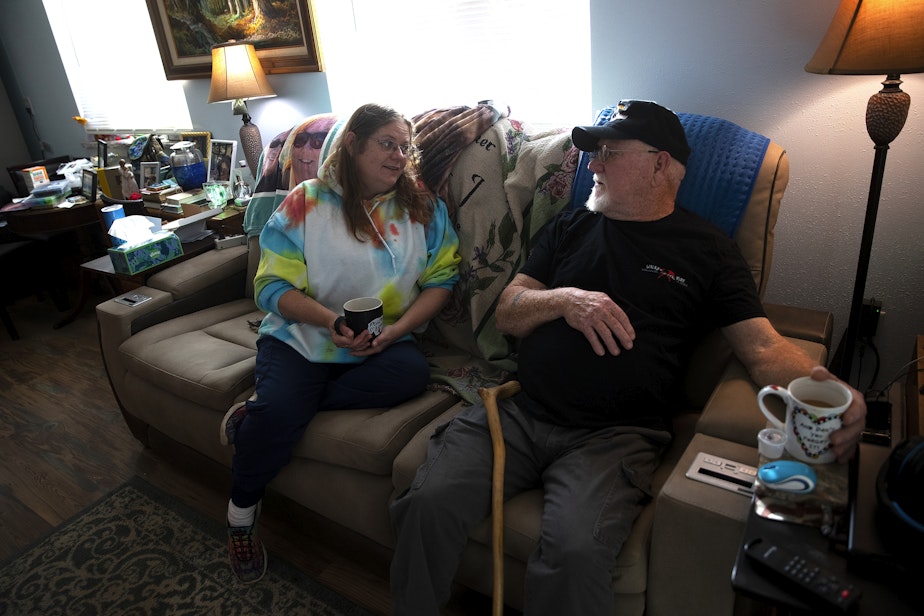Aging Boomers can't find caregivers in rural WA. Who can fill the gap?

What Rita Cooper did when both of her parents were diagnosed with cancer in 2016 might sound drastic.
She got out of her lease; found new schools for her sons; found new jobs for her and her husband; and moved her whole family from the Seattle suburb of Kent to Cashmere, the sleepy town near Wenatchee where her parents were living.
She bought a house, built a mother-in-law in the back, and moved her parents in.
“I have friends of mine — super sweet people too — [who say], ‘Oh, I could never do that,’” Cooper said.
Boomers in Central Washington, like Cooper’s parents, are growing older and needing more care. But their kids have moved away to bigger cities and there aren’t enough nursing homes and paid in-home caregivers to take care of everyone. This pattern holds true across the United States: Rural areas are graying a lot faster than urban centers, and there’s not enough elder care to go around. The Alzheimer’s Association estimates that Washington will need about 20,000 more paid caregivers by 2030 — concentrated in rural counties.
Rita Cooper decided the best option for her family was to become the caregiver herself and move her parents into her family’s home.
“If they have any problem, they know they can ask me and I can just be right there,” Cooper said. “It made it better for them that they felt secure, protected, and taken care of.”
It’s been a lot of work: driving her parents to their appointments; cooking for them and helping them take their medicine; and calming her dad, who has dementia, when he gets agitated.
Eventually, caregiving, alongside parenting, became a full-time commitment, so Cooper had to quit her job at a motel.
“It was hard because, well, we need the money,” Cooper said. “Even while I was working, we always seemed to struggle. We were always paycheck to paycheck as it was.”
Cooper’s mom recently passed away, so now she’s focused on caring for her dad.
Another option for people in Cooper’s situation is to hire an in-home caregiver — but those can be expensive, and hard to come by.
“It used to be there was so many people coming into the health-care field … we had multiple people we could hire all the time,” said Laurie Balo. She’s the eastern Washington director for All Ways Caring, an agency that finds in-home caregivers for people who need them. She said people used to view caregiving as a stepping stone into other health-care jobs, like becoming an RN.
That meant she used to be able to tell people, “Yes, we can help you. We can provide you with a great caregiver right off the bat and help you live your best life in your home.”
But, now, she said, she can’t hire nearly enough caregivers to meet the demand.
“It’s changed so much,” Balo added. “I never thought I would see it like this.”
Balo said it’s especially difficult to serve clients who don’t live near a sizable town. The state legislature took steps this year to try to boost the caregiver workforce, including giving prospective caregivers more time to get certified, and creating a plan aimed at making it easier for them to take certification exams.
But it will take time for those changes to come online, and it’s just a partial fix.

At a recent support group meeting in downtown Cashmere, caregivers swapped stories about how they’re making things work: One person moved her mom from a small town on the Olympic Peninsula into her home in Cashmere. Another person found her husband a spot in a memory care unit in Moses Lake, an hour and a half away. Another’s husband is in a memory care facility in Seattle, a three-hour drive from Cashmere that she doesn’t attempt in the winter.
Shirley, who recently had a stroke and needs help with almost everything, relies on a paid caregiver coming into her home a few hours a week. She asked KUOW not to publish her last name to protect her private health information.
Shirley lives in Wenatchee, but her kids are in Spokane, a three-hour drive away.
“They're not the frisky little dudes they used to be,” Shirley said. “They brought me a bed, and they said, ‘That's the last thing we're bringing down here to you. It's getting too hard for us.’”
Shirley qualifies for free caregiving through the state, because she’s on Medicaid.
Shauna Desjardins is a certified nursing assistant who helps take care of her. Desjardins used to work in a nursing home, but, for the past 10 years, she’s been an in-home caregiver.
“When I worked in the facility, most of the residents wanted to go home,” Desjardins said. “A lot of them would just ask, ‘When can I just go home?’ And so I wanted to go and be a caregiver … and help people stay in their home.”
Shirley said she’s really come to rely on the help from Desjardins.
“I will sit down and cry if they take her away,” Shirley said.




